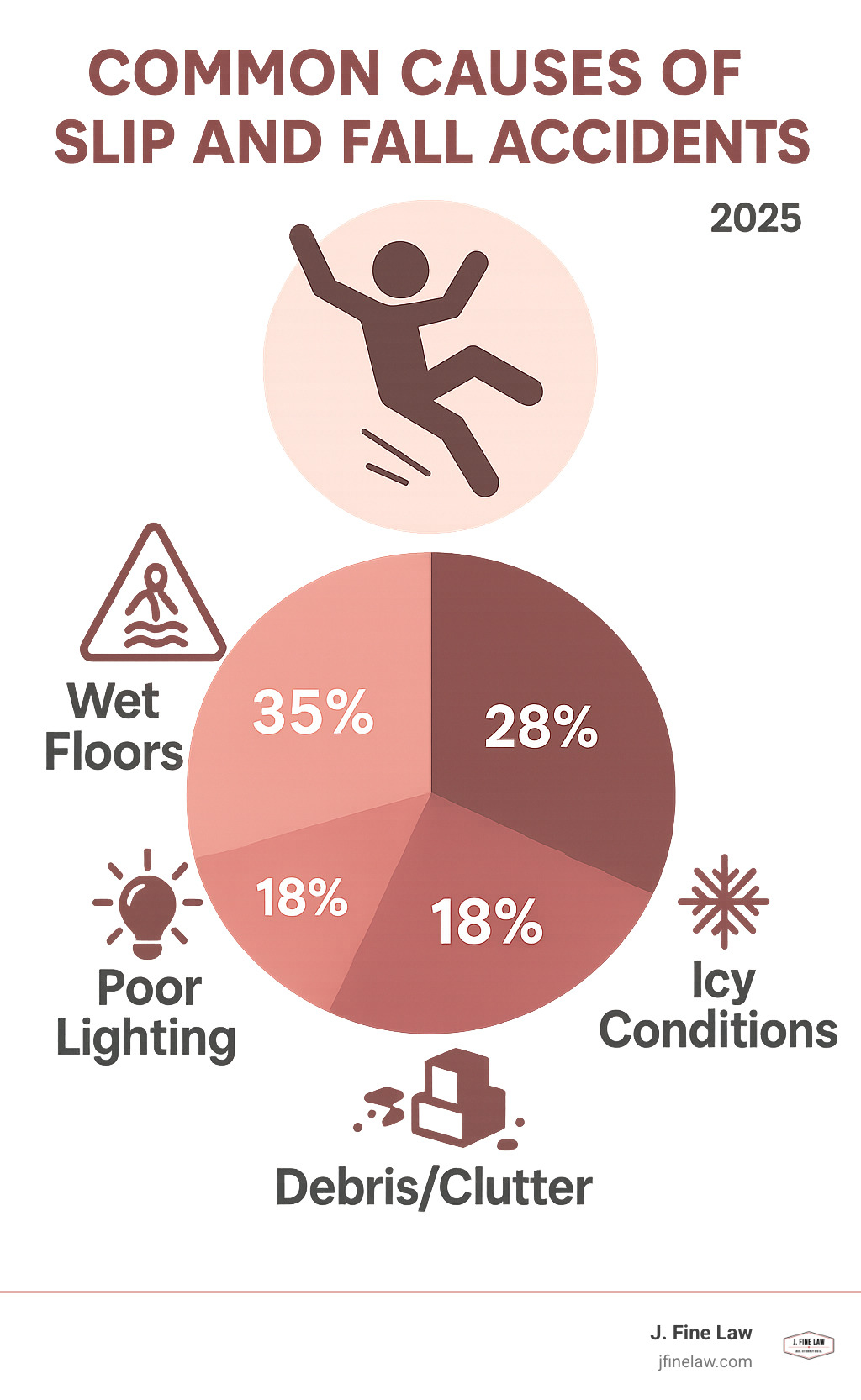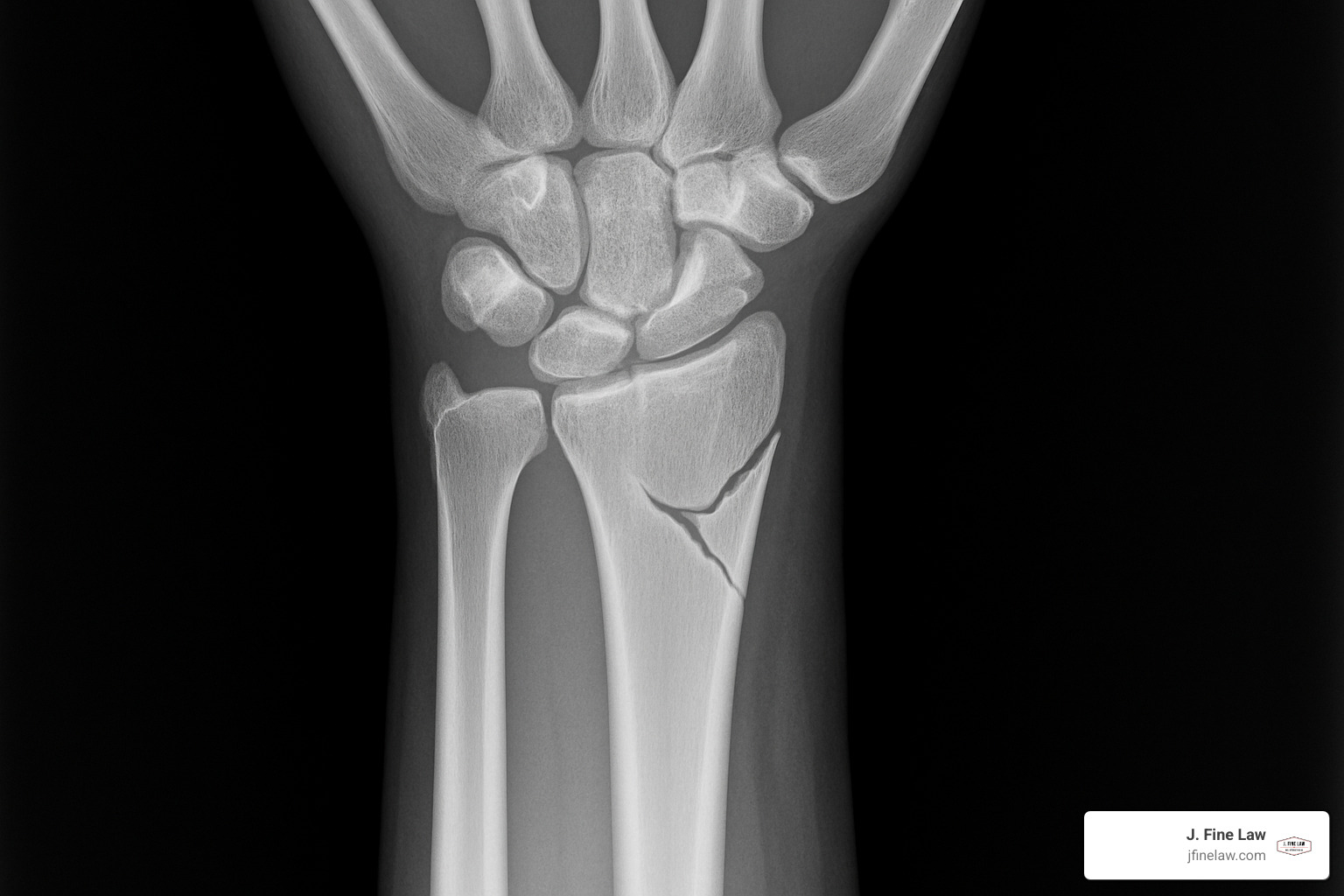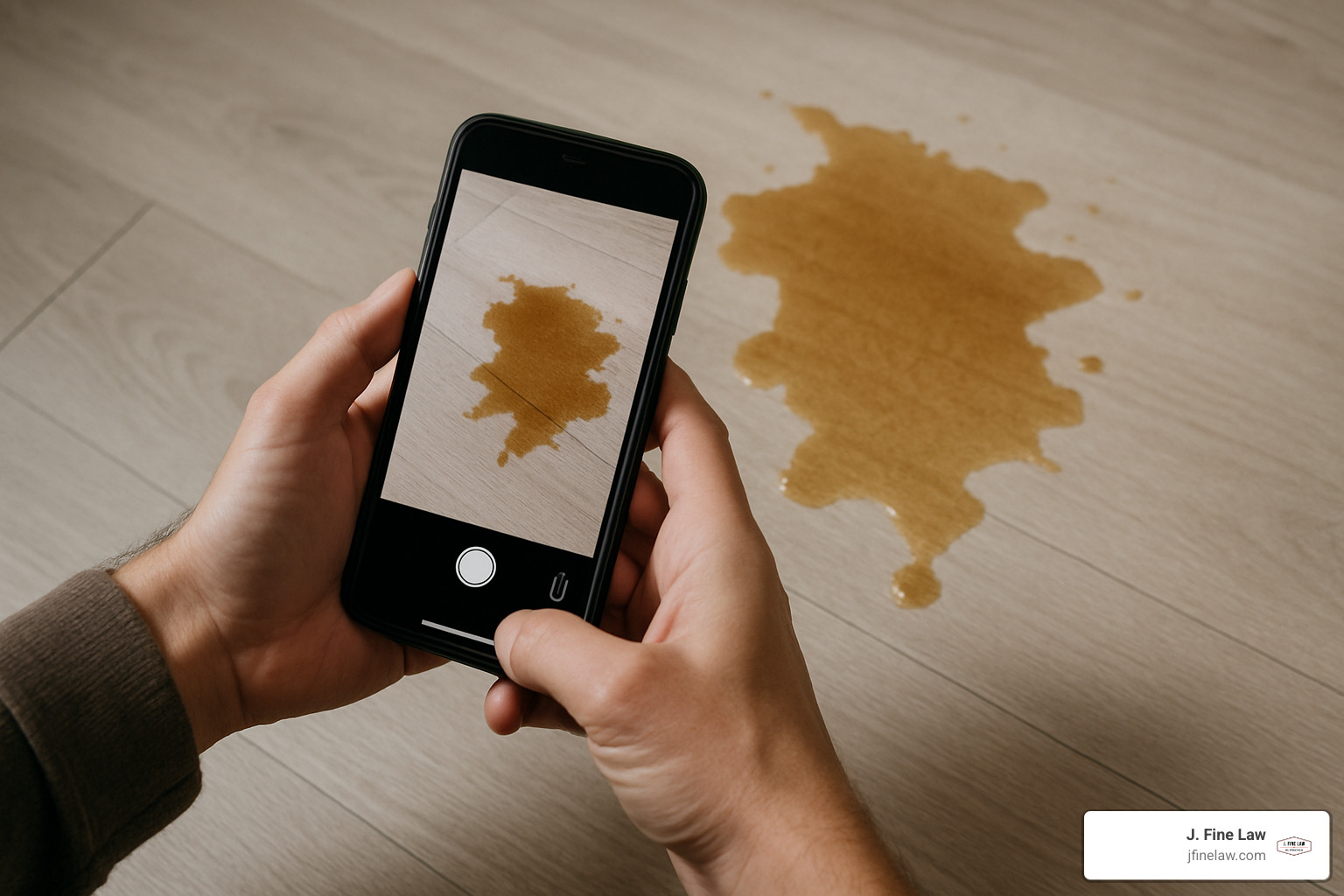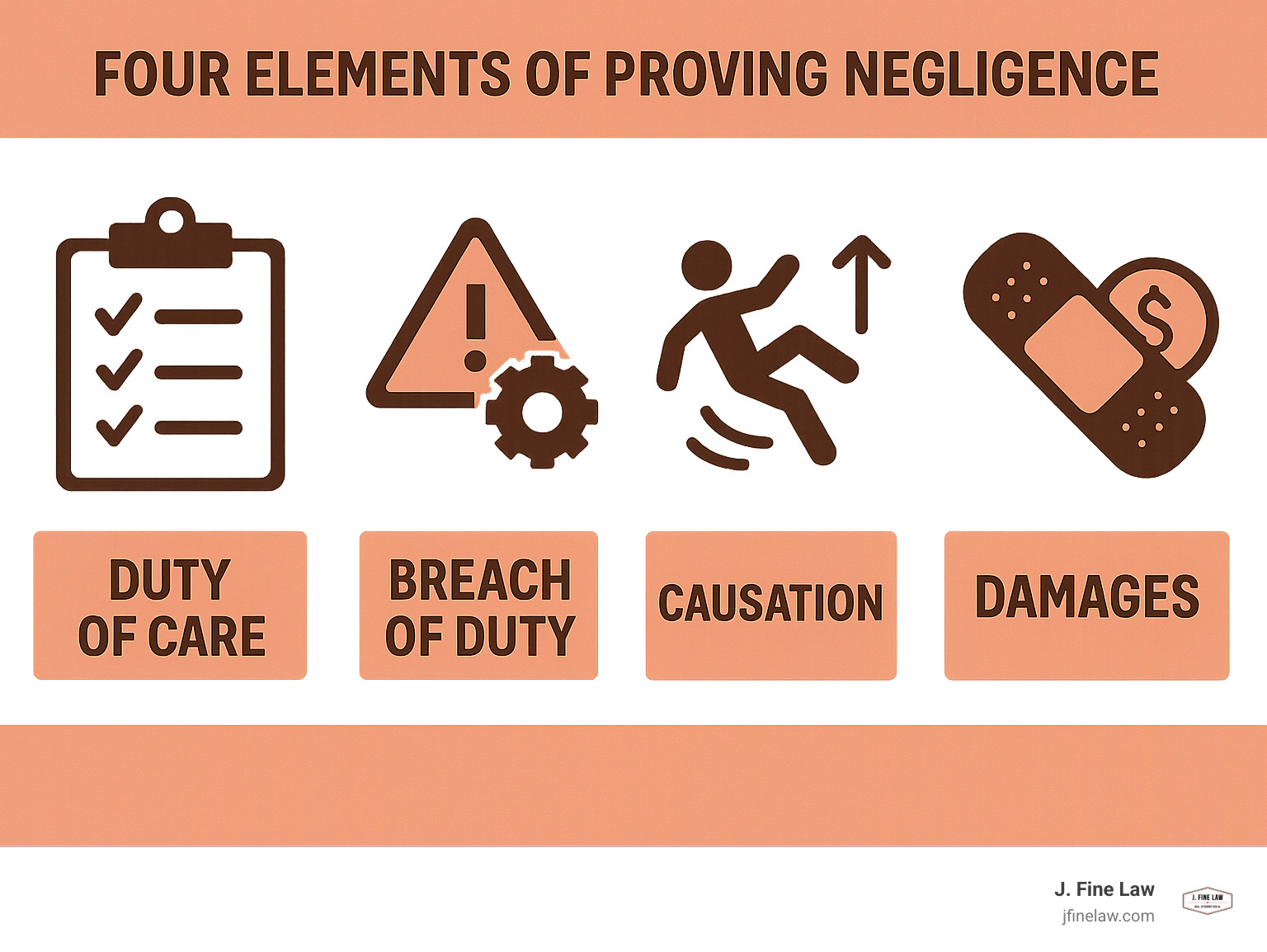Why Philadelphia Slip and Fall Victims Need Legal Protection
Slip and fall accidents are rarely “just bad luck.” In the vast majority of cases, they are the direct result of a property owner’s negligence—a failure to maintain a safe environment for visitors. This negligence leaves victims with debilitating injuries, significant time away from work, and a mountain of unexpected medical bills. The statistics are staggering: more than 8 million emergency-room visits each year nationwide are due to falls, and Philadelphia, with its mix of historic properties and busy commercial centers, sees thousands of these preventable injury claims annually.
Immediately following a fall, insurance carriers for the property owner spring into action. Their primary objective is not your well-being, but the protection of their bottom line. They employ adjusters trained to minimize or deny claims. You may be told the accident was your fault, that your injuries aren’t serious, or be pressured into accepting a quick, lowball settlement that fails to cover the true extent of your losses. This is precisely why securing an experienced slip and fall lawyer in Philadelphia is not a luxury, but a necessity.
As the founder of J. Fine Law, I have dedicated my 25-year career to championing the rights of injured Pennsylvanians and New Jersey residents. Our firm has successfully recovered over $50 million for our clients, backed by a 98 percent success rate. My team possesses an intimate understanding of the tactics insurers deploy. We know how to counteract them by carefully gathering the evidence needed to establish clear proof of negligence—whether your fall occurred on an icy sidewalk in Center City, a wet floor in a suburban grocery store, or a dangerously crumbling apartment stairwell in South Philly.
Understanding the legal terminology is the first step toward empowerment. Here are some key areas we handle:
What Constitutes a Slip and Fall Case in Philadelphia?
Under Pennsylvania’s premises liability law, the right to seek compensation hinges on proving that a property owner failed to provide a reasonably safe environment. To build a successful claim, your attorney must establish four key elements:
- A Duty of Care Existed: The property owner had a legal responsibility to keep the premises safe for you. In Pennsylvania, this duty varies based on your status as a visitor. An invitee (like a customer in a store) is owed the highest duty of care, requiring the owner to inspect for, repair, and warn of dangers. A licensee (a social guest) must be warned of known dangers. A trespasser is generally owed no duty, with important exceptions for children.
- The Owner Breached That Duty: The owner knew or reasonably should have known about a hazardous condition but failed to fix it or provide adequate warning. This could be anything from failing to mop up a spill in a timely manner to ignoring a broken handrail for weeks.
- That Breach Caused Your Fall: You must directly link the hazardous condition to your fall and subsequent injuries. The defense will often try to argue that something else caused your fall, making a clear chain of causation essential.
- You Sustained Damages: You suffered actual harm, which can be quantified in terms of financial losses and personal suffering. This includes medical bills, lost income, and pain.
Typical hazards that lead to valid claims include wet or freshly waxed floors, icy sidewalks, uneven or cracked pavement, poor lighting in hallways or stairwells, and cluttered aisles. For a deeper dive, you can review our premises liability lawyer page or the National Floor Safety Institute Quick Facts.
Common Slip and Fall Locations
- Supermarkets & grocery stores: Spills from broken jars, tracked-in rain or snow, and fallen produce create slick, dangerous surfaces.
- Restaurants & bars: Greasy kitchen floors, spilled drinks, and dimly lit atmospheres can easily lead to falls.
- Parking lots: Potholes, cracked pavement, inadequate lighting, and uncleared ice or snow are common culprits.
- Apartment buildings: Worn-out carpets, broken stairs, leaky pipes causing puddles, and poorly lit common areas pose significant risks to tenants.
- Workplaces: Cluttered walkways, industrial spills, and unsafe ladders or scaffolding can cause on-the-job injuries.
- Government buildings & public sidewalks: Cracked sidewalks and poorly maintained public spaces can lead to claims, though special rules apply.
The Most Common Injuries
A sudden fall can cause severe, life-altering injuries, including:
- Bone fractures: Hips, wrists, and ankles are particularly vulnerable and can require surgery, pins, and extensive rehabilitation.
- Traumatic brain injuries (TBI): Even a seemingly minor blow to the head can cause a concussion or more severe TBI, leading to long-term cognitive issues, memory loss, and personality changes.
- Spinal cord damage: Damage to the vertebrae or spinal cord can result in chronic pain, herniated discs, and in the most severe cases, partial or full paralysis.
- Soft-tissue sprains and tears: Severe sprains, torn ligaments (like an ACL), or damaged tendons can be incredibly painful and may require surgery and physical therapy to heal properly.
Find injury-specific guidance on our Philadelphia slip and fall injury lawyer page.
Critical Steps to Take Immediately After an Accident
The actions you take in the minutes and hours after a fall can significantly impact your health and your ability to recover fair compensation. Follow these steps carefully:
- Get Medical Help: Your health is the top priority. Call 911 for serious injuries. For any injury, see a doctor as soon as possible. This not only ensures you receive proper care but also creates a crucial medical record that officially documents your injuries and links them to the date of the accident.
- Report the Incident: Notify the property owner, manager, or landlord about your fall immediately. Ask them to create a formal incident report and request a copy for your records. If they refuse, write down the name of the person you spoke to, the date, and the time.
- Document Everything: Use your smartphone to become your own investigator. Take numerous photos and videos of the exact hazard that caused you to fall (the spill, ice patch, broken step). Capture the surrounding area, noting the lack of warning signs. Also, photograph your visible injuries and any damage to your clothing.
- Collect Witness Names and Numbers: If anyone saw you fall or saw the hazardous condition before your fall, ask for their name and phone number. Independent witness testimony can be incredibly powerful in countering an owner’s claim that they were unaware of the danger.
- Preserve Evidence: Do not wash the clothes or shoes you were wearing. Place them in a sealed bag. They may contain evidence of the substance that caused your fall. Importantly, never admit fault, apologize, or say you are “okay.” These statements can be used against you later.
For more tips, see our slip and fall accident lawyer Philadelphia resource or this AAOS guide on providing aid.
Dealing with Property Owners and Insurance
When you speak with the property owner or their insurance adjuster, be polite but brief. State only the basic facts: where and when the fall occurred. Politely decline to give a recorded statement or sign any documents, including medical authorizations, until you have consulted with an attorney. Insurance companies use these early conversations to find reasons to deny your claim. An initial settlement offer is almost always a lowball tactic designed to make you go away cheaply. Professional legal negotiation is the only way to level the playing field.
Proving Liability and Seeking Fair Compensation
A successful slip and fall case requires fitting together the four puzzle pieces of negligence—duty, breach, causation, and damages. Identifying the responsible party is a critical first step. Liability may fall on a commercial property owner, a management company, a retail tenant, a homeowner, or in some complex cases, a government entity.
How We Prove Negligence
Our legal team launches an immediate and thorough investigation to build an ironclad case on your behalf. This process includes:
- On-site Investigation and Photography: We often return to the scene to take detailed measurements, document conditions, and identify any building code violations that may have contributed to the fall.
- Securing Security Footage: We immediately send a legal notice, known as a spoliation letter, to the property owner demanding they preserve any video surveillance footage of the incident before it is erased, which often happens automatically within days.
- Reviewing Maintenance Logs and Records: These documents can reveal a pattern of neglect, prior complaints about the same hazard, or a failure to follow established safety procedures.
- Interviewing Witnesses and Hiring Experts: We depose witnesses to lock in their testimony. When necessary, we retain highly qualified experts, such as engineers to analyze structural defects or medical professionals to provide testimony on the long-term impact and cost of your injuries.
See examples of our results on the Pennsylvania settlements page.
Comparative Negligence in Pennsylvania
Insurance companies will often try to shift blame onto the victim. Pennsylvania follows a modified comparative negligence rule, also known as the 51 percent bar rule. This means your compensation can be reduced by your percentage of fault. For example, if you are awarded $100,000 but are found to be 20% at fault (perhaps for being distracted by your phone), your award is reduced to $80,000. However, if you are found to be 51% or more at fault, you are barred from recovering any compensation at all. You can review the specific language in the statute.
Recoverable Damages
We fight to recover compensation for every aspect of your losses, which are typically categorized as:
- Economic Damages: These are your tangible financial losses, including all current and future medical bills, physical therapy costs, lost wages from missed work, and diminished future earning capacity if your injuries prevent you from returning to your previous job.
- Non-Economic Damages: These compensate you for the intangible, personal losses you have suffered, such as physical pain, emotional distress, anxiety, scarring and disfigurement, and the loss of life’s pleasures (the inability to enjoy hobbies and activities you once loved).
Why You Need a Philadelphia Slip and Fall Lawyer
Navigating the aftermath of a slip and fall is a daunting task. The combination of complex premises liability rules, strict filing deadlines, and the aggressive tactics of insurance companies creates a minefield for unrepresented victims. Independent studies have consistently shown that claimants who hire a personal injury lawyer receive, on average, settlements that are three times larger than those who attempt to negotiate on their own.
At J. Fine Law, we remove the financial barriers to expert legal help. We operate on a contingency fee basis, which means there is no upfront fee to hire our firm. We advance all case costs, from filing fees to expert witness retainers. Our fee is a percentage of the compensation we recover for you, and we only get paid if we win your case. This arrangement ensures our goals are perfectly aligned with yours: to maximize every single dollar you are rightfully owed.
Learn more on our slip and fall personal injury lawyers page.
The Advantage of Representation
- Accurate Case Valuation: We go beyond simply adding up your current bills. We consult with medical and financial experts to project the full lifetime cost of your injury, ensuring no future need is overlooked.
- Skilled Negotiations: We are fluent in the language of insurance adjusters. We counter their lowball offers with a carefully prepared demand package that details the strength of our liability claim and the full extent of your damages.
- Litigation Experience: While most cases settle, our reputation as trial-ready attorneys gives us a significant advantage. If the insurance company refuses to make a fair offer, we are fully prepared to take your case to court and fight for a verdict.
- Stress-Free Recovery: Handling a legal claim is a full-time job. By retaining our firm, you transfer that burden to us. We manage the paperwork, deadlines, and all communication, allowing you to focus completely on your physical and emotional recovery.
Frequently Asked Questions about Philadelphia Slip and Fall Claims
What is the statute of limitations for a slip and fall in PA?
In most cases, you have two years from the date of the accident to file a lawsuit. This is a strict deadline, and if you miss it, you will lose your right to sue. An important exception exists for claims against a government entity (like the City of Philadelphia or SEPTA), which require you to provide formal written notice within just six months. You can see the full law here.
What if I was hurt at work?
If you slip and fall while on the job, you are generally entitled to workers’ compensation benefits through your employer. However, if a separate, non-employer entity (a third party) was responsible for the hazard—such as a cleaning service that left a floor wet or the owner of the building where you work—you may also pursue a third-party personal injury claim for damages not covered by workers’ comp, like pain and suffering.
Can I sue for a fall on a public sidewalk?
Yes, in many situations. In Philadelphia, the legal responsibility for maintaining a public sidewalk in safe condition typically falls on the adjacent property owner. If they fail to repair cracks or clear ice and snow, they can be held liable. In some limited circumstances, the City of Philadelphia may be responsible, but these cases have unique challenges and the six-month notice rule applies. It is vital to call a slip and fall lawyer quickly to determine the liable party and protect your rights.
How much is my slip and fall case worth?
There is no simple calculator for a case’s value, as each one is unique. The final amount depends on many factors, including the severity of your injuries, the total of your medical bills (past and future), the amount of your lost wages, the strength of the evidence against the property owner, and your assigned percentage of fault, if any. An experienced attorney can evaluate these factors to give you an accurate assessment of your claim’s potential value.
What if the owner says they didn’t know about the hazard?
A property owner can still be liable even if they didn’t have actual knowledge of the danger. The law applies a standard of constructive notice, which means they should have known about the hazard through reasonable care and regular property inspection. For example, if a freezer in a grocery store has been leaking for hours, the store is considered to have constructive notice because a diligent employee should have finded it.
What does it cost to hire J. Fine Law?
We believe everyone deserves access to justice, regardless of their financial situation. That is why we handle all slip and fall cases on a contingency fee basis. This means you pay zero upfront costs. We cover all expenses of building your case, and we only receive a fee if and when we successfully recover compensation for you through a settlement or verdict.
Take the Next Step to Protect Your Rights
After a serious fall, time is not on your side. Critical evidence like security camera footage can be erased within days. The memories of witnesses can fade. Most importantly, strict legal deadlines are already ticking. The longer you wait, the more difficult it becomes to build a strong case and fight back against the insurance company that is already working to deny your claim.
Don’t let a negligent property owner’s mistake dictate the rest of your life. Let J. Fine Law put our proven track record—a 98 percent success rate and $50 million in recoveries—to work for you. We have the resources, experience, and dedication to hold negligent parties accountable and secure the maximum compensation you deserve.
Your consultation is free, confidential, and carries no obligation. Contact us today to share your story with a compassionate and experienced Philadelphia slip and fall attorney. We are here to listen and ready to fight for you. We only get paid when you do. Visit our Pennsylvania slip and falls page or contact us today to get started.





